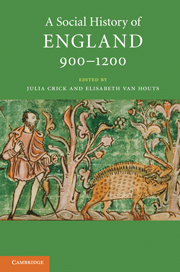Book contents
- Frontmatter
- Contents
- List of figures
- List of maps and tables
- List of contributors
- Acknowledgements
- List of abbreviations
- Map 1 England and its neighbours
- Map 2 England 900–1200
- I Introduction
- I.1 Land use and people
- I.2 Water and land
- I.3 Forest and upland
- I.4 Mineral resources
- I.5 Health and disease
- II.1 Authority and community
- II.2 Lordship and labour
- II.3 Order and justice
- II.4 War and violence
- II.5 Family, marriage, kinship
- II.6 Poor and powerless
- III.1 Towns and their hinterlands
- III.2 Commerce and markets
- III.3 Urban planning
- III.4 Urban populations and associations
- IV.1 Invasion and migration
- IV.2 Ethnicity and acculturation
- IV.3 Intermarriage
- IV.4 The Jews
- V.1 Religion and belief
- V.2 Rites of passage and pastoral care
- V.3 Saints and cults
- V.4 Public spectacle
- V.5 Textual communities (Latin)
- V.6 Textual communities (vernacular)
- VI.1 Learning and training
- VI.2 Information and its retrieval
- VI.3 Esoteric knowledge
- VI.4 Medical practice and theory
- VI.5 Subversion
- Glossary
- Time line 900–1200
- Further reading
- Index
- References
II.1 - Authority and community
Published online by Cambridge University Press: 05 June 2012
- Frontmatter
- Contents
- List of figures
- List of maps and tables
- List of contributors
- Acknowledgements
- List of abbreviations
- Map 1 England and its neighbours
- Map 2 England 900–1200
- I Introduction
- I.1 Land use and people
- I.2 Water and land
- I.3 Forest and upland
- I.4 Mineral resources
- I.5 Health and disease
- II.1 Authority and community
- II.2 Lordship and labour
- II.3 Order and justice
- II.4 War and violence
- II.5 Family, marriage, kinship
- II.6 Poor and powerless
- III.1 Towns and their hinterlands
- III.2 Commerce and markets
- III.3 Urban planning
- III.4 Urban populations and associations
- IV.1 Invasion and migration
- IV.2 Ethnicity and acculturation
- IV.3 Intermarriage
- IV.4 The Jews
- V.1 Religion and belief
- V.2 Rites of passage and pastoral care
- V.3 Saints and cults
- V.4 Public spectacle
- V.5 Textual communities (Latin)
- V.6 Textual communities (vernacular)
- VI.1 Learning and training
- VI.2 Information and its retrieval
- VI.3 Esoteric knowledge
- VI.4 Medical practice and theory
- VI.5 Subversion
- Glossary
- Time line 900–1200
- Further reading
- Index
- References
Summary
England between the late ninth and twelfth centuries suffered more conquests than any other western European kingdom of the period. Despite the disruption and dislocation caused by events which contemporaries perceived as catastrophes, the kingdom during these three centuries saw the development of structures of power – the state, aristocracy, families, and rural and urban customs – that shaped the lives of its inhabitants, a population numbering close to 2 million at least in 1087. These structures determined much of what the English people did not only by laying out the boundaries for action, but also by compelling it. Everywhere one looks in western Europe, kings ruled through their own agents and, by controlling their aristocracies, reached into the lives of their subjects, provoking comparable praise and complaints. Viewed close up, however, England appears remarkably distinct.
Our understanding of the actions of governments, lords, families and even slaves must rest on a broad understanding of the authority which the different elements of English society enjoyed and practices to which they were subjected. At a fundamental level, the power behind both authority and actions could work de iure or de facto. A king or lord, for example, had power to direct others to do or not to do certain things, while those so directed possessed a more limited ability to negotiate their own compliance or to resist.
- Type
- Chapter
- Information
- A Social History of England, 900–1200 , pp. 76 - 97Publisher: Cambridge University PressPrint publication year: 2011
References
- 3
- Cited by



